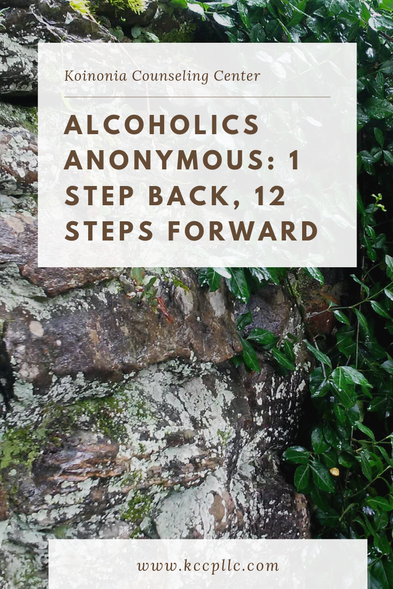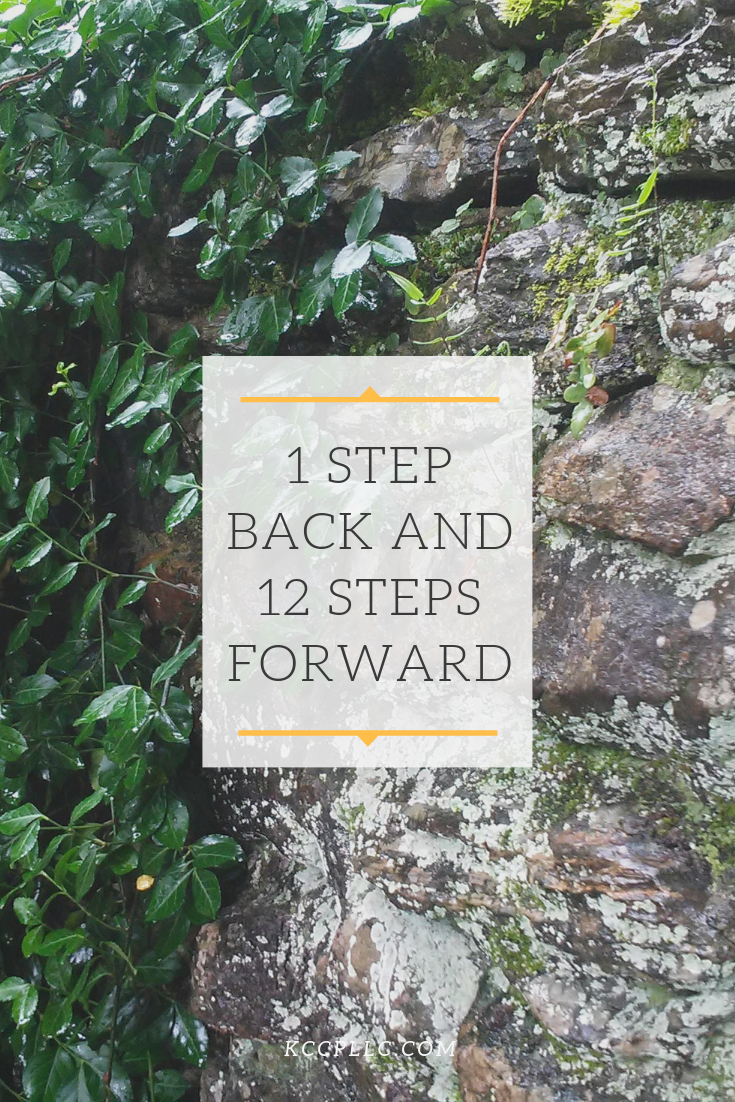 Ah, the steps of a twelve-step program. Anyone who has ever fought through an addiction knows the twelve steps quite well, but how many people even know what the twelve steps are or what they mean. Below is the explanation of the twelve steps as brought to you by me (a little) and Marin Hann MA, LLPC (a whole lot). This is in script form as it was one of our psychoeducational speeches at Community Recovery. Step 1: “We admitted we were powerless–that our lives had become unmanageable.” I was having a lot of issue with depression/ anxiety and things were not going well. Marin: What she didn’t tell me was how drastically difficult it can be to admit I’m powerless. Even when we think we’ve finally admitted it we haven’t. There is no finally. One minute I may believe I’m powerless, the next minute I think I have control over my life. And don’t even get me started on realizing my life had become unmanageable because what she didn’t tell me was that even after I got through step 12, I still have days when I convince myself I can manage this. I can’t though. I can’t manage this at all. Step 2: “Came to believe that a Power greater than ourselves could restore us to sanity.” “So, this step wasn’t so terribly bad, I mean, I am a Christian” Marin: What she said made sense. I’m a Christian too. Here’s what she didn’t tell me. She didn’t tell me that being a Christian didn’t guarantee me on easy pass on this. She didn’t share that I would have to realize that believing God could and God would be two different things. So, step 2, yeah, I thought it would be fine and an easy slide into step 3. Step 3 is connected to that: "Made a decision to turn our will and our lives over to the care of God as we understood Him. I totally realized I had to put more faith into God" Marin: You know what she said? She said more. She didn’t say all. Christians, 12 step members, we like to talk about turning our will over. We like to talk...and talk...and talk about it. And what I know now that I didn’t know in the beginning was that when I said in step 2 that God could restore me to sanity...what I hadn’t yet admitted was that I wasn’t sure he would. And there it was. I was questioning God’s character and in the same breath saying I’d turn my will and life over to Him. But hey...I’m a Christian I’ve already turned my life, over right? That’s a onetime thing. Yeah no. Wrong. So wrong. But that’s a messy message. No one wants to hear that message. Or...do they? Step 4: "Made a searching and fearless moral inventory of ourselves. I had to dig into some really difficult times in my life, but it was fine, it was for the best” Marin: In that sentence do you know what I heard? “It was worth it.” But there are things she’s not saying when she quickly tells me that she had to really dig into some difficult times in her life. She didn’t say searching meant falling into pieces. She didn’t say searching would make me want to act out like never. She didn’t say that fearless meant that the inventory was fearless. That the inventory is honest, but that I would be afraid. Step 4 will scare you...it always does. You will want to give up. You will want to water Step 4 down. You may have to start from scratch and go back to step 1, then 2, then 3, then 4 again. Some of us didn’t make it to 5 the first time around. That’s the truth. But after all that...I can say this - I’m a different person then I was before step 4...and that is a beautiful thing. Step 5: "Admitted to God, to ourselves and to another human being the exact nature of our wrongs". Marin: I heard her. I heard it was difficult. It’s one thing to write down the exact nature of my wrongs, and it’s even one thing to admit to God, maybe even harder to admit to myself and say it out loud...but to tell another person? That’s something else entirely. She told me it was difficult. She didn’t tell me why. Maybe you think she didn’t tell me because it’s obvious why. I thought it was too. But then I realized why confessing our wrongs to someone is so terrifying. We know how to do it from a place of shame. We know how to say how horrible we think we are. But to share those same things from a place of grace? That’s...I mean...I have been given the inexhaustible grace of The God of the entire universe and I still don’t know how to do that. tep 6: "Were entirely ready to have God remove all these defects of character. I was ready to just give the control over to God, so he could remove my flaws". Marin: Here is the thing that’s not being mentioned here. No one is ever entirely ready. You are going to mess up again. You are going to be manipulative, deceitful, lazy, arrogant, prideful, resentful, bitter. It will happen again. So entirely ready is unfortunate phrasing. Entirely ready to have to be ready repeatedly? That’s what Step 6 means. Step 7: "Humbly asked Him to remove our shortcomings" Marin: She didn’t mean that. It is difficult. It’s difficult to figure out what humility is. It’s difficult to ask for forgiveness, and even more so to want to. I WISH she would have told me that I’d learn something dark about myself. That the broken part of me doesn’t want God to remove my pride, my resentment, my bitterness, my lust. That there is a part of me that likes those things. And then just like that we are back to Step 1...I like those evil things. In my own power I like my flaws and I like my addiction. Without God I hardly recognize flaws for the evil that they are. I’ll destroy myself. So yes, I am powerless, and my life has become unmanageable. I am powerless. He is not. I cannot do this. He can. Step 8: "Made a list of persons we had harmed and became willing to make amends to them all.” I can be a helping hand. I thought I was honest with myself the first time, but there were a few people and things I forgot the first time around. Making a list keeps things in order. Step 9: “Made direct amends to such people wherever possible, except when to do so would injure them or others.” They are ready. I know for me, I had to tell people I was sorry, but I had God behind me. Marin: She told me that she had to say sorry, but she didn’t tell me that she had to learn how. Look, no one can sell this program. It’s way too difficult to sell. All anyone in recovery can do is tell you about their recovery. It’s messy. I can tell you that I discovered I did not know how to apologize. And I can tell you that most of us in this room don’t know how to apologize. But in recovery, you practice. It’s like a muscle that hasn’t been used. You must use it, or you forget how. Step 10: "Continued to take personal inventory and when we were wrong promptly admitted it". I thought doing the continued inventory was easy, you just must remember to be honest with yourself and others. Marin: She forgot that you must be prompt. Not honest in a few minutes, a few hours, the next day. Honest now. In the moment you mess up, the moment you are tempted. Tell yourself it happened and immediately text or call someone else to tell them that it happened. I’ve done poorly with this step and since I’ve really started a twelve-step recovery program I have relapsed/slipped (whatever you want to call it) 4 times. I didn’t admit the months and months of issues leading up to them in the moment they happened. Addiction doesn’t barge down the doors, it slowly trickles in through the floor, the ceiling, the walls. If you have a leak and you don’t admit you have a leak, then guess what? Your roof is going to cave in. But here’s some experience strength and hope from me - if it does cave in, if you do relapse...don’t stay drowning in the downpour. You’re made in the image of God so get back up and run back to him. Every moment of recovery is beautiful and not to be discounted. A relapse isn’t hopeless and it’s not a sentence. So, if you’re relapsing then promptly admit it and get back to the beauty of recovery in God. It’s still there. I promise. Step 11: "Sought through prayer and meditation to improve our conscious contact with God as we understood Him, praying only for knowledge of His will for us and the power to carry that out". This is where your continued strength can come from, I continue to pray and whatever God’s will is for my life, then so be it (or I am okay with it). Marin: Well didn’t that sound simple. Look...in this you need a relationship with God. And serious relationships are complex, constant, they adapt, they grow. I’m not going to lie and say that prayer is easy. That a relationship with God is easy. My relationship with God has made my life incredibly difficult...and I’ve suffered by being a Christian. It’s not an easy path. But it’s the best one. It will hurt, but it’s how to keep on living. It’s work like breathing is work. Breathing is hard. Sure, your body does it automatically most of the time, but your body is constantly working very hard even while you sleep. And on top of that, no one is capable of always breathing properly. You want to know how I know that? 90% of you thought about and tried to focus on how you were breathing just now. The other 10% of you just caught up to join the party. That’s why we need to learn to breathe in anxiety, remember to breathe when we work out, it’s why breathing exercises exist. We struggle to do the thing that keeps us alive and we must keep practicing how. A relationship with God is like that. It’s like breathing. Step 12: "Having had a spiritual awakening as the result of these steps, we tried to carry this message to alcoholics and to practice these principles in all our affairs". I really hope I was helpful. I just want to tell you how wonderful the 12-step program is. I think you’ll find success with it.
0 Comments
Leave a Reply. |
This Is What You'll Find HereHere you'll find all the extra goodies like blog post, podcast, public speaking events and other community activities. Archives
December 2022
Categories |


 RSS Feed
RSS Feed